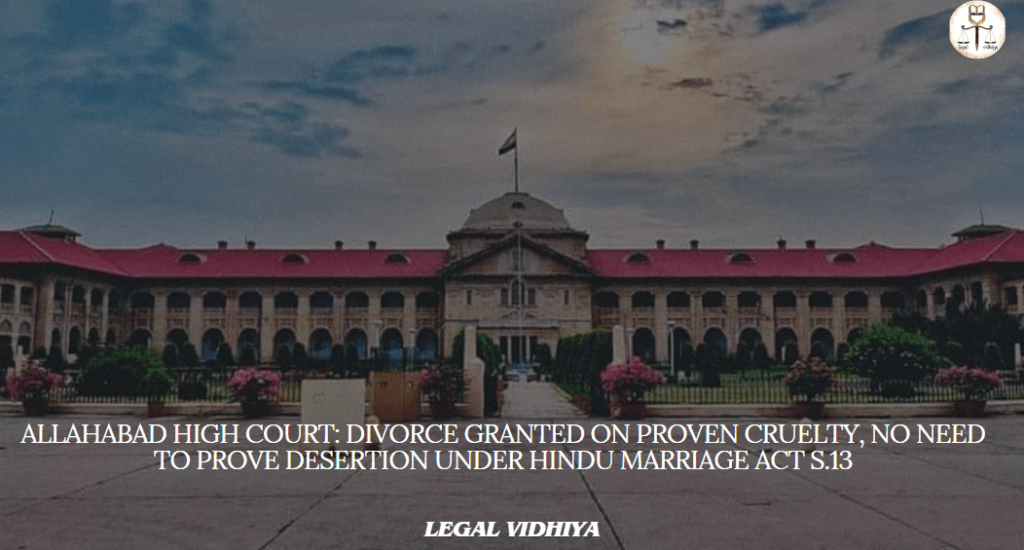
Allahabad High Court: Divorce Granted on Proven Cruelty, No Need to Prove Desertion Under Hindu Marriage Act S.13It has been held by the Allahabad High Court that, if cruelty has been found or proved by the family court, then the marriage between the two parties ought to be dissolved. The Court ruled that a marriage cannot be restored simply because desertion is not proven.
The Court determined that the divorce grounds listed in Section 13(1) of the Hindu Marriage Act are independent of each other. If any single ground is proven, divorce must be granted. The use of ‘or’ between each ground indicates they are disjunctive. Section 13(1) (ia) of the Hindu Marriage Act, 1955 allows for divorce on the grounds of cruelty. The Uttar Pradesh state amendment to this section specifies that divorce can be granted if the petitioner has been repeatedly or persistently subjected to cruelty, creating a reasonable fear that living with the other party would be harmful or injurious.
Referring to the above-mentioned ground of divorce, the bench of Justice Rajan Roy and Justice Om Prakash Shukla held that “It has to be understood that each of these grounds are mutually exclusive to each other which is evident by use of the disjunctive ‘or’ to separate each ground from the other and there is no reason to read ‘or’ conjunctive as it will lead to absurdity. Thus, cruelty can by itself be a ground for dissolution of marriage. However, it seems that learned Family Court, after returning a finding that “cruelty” has been inflicted by the respondent-wife on the appellant-husband, refused to grant divorce to the husband presumably on the ground that the ground of “desertion” could not be proved by the appellant – husband”
This was mentioned in the case of Dr. Bijoy Kundu v. Smt. Piu Kundu 2021. Herein the two parties married in 1986 and have two sons together, it was alleged by the husband (appellant) that his wife (respondent) started abusing him and his parents after conceiving. The two parties, since after 2003 would communicate with each other through their sons or text messages, and were living separately under the same roof. The appellant then filed for divorce under Section 13 of the Hindu Marriage Act, 1955. Following the filing of the divorce petition, the wife initiated several criminal cases under the Domestic Violence Act, Dowry Prohibition Act, Section 125 CrPC, and filed a suit under Section 9 of the Hindu Marriage Act for the restitution of conjugal rights. In her written statement to the Family Court, the respondent-wife denied all allegations and asserted that she was caring for her husband and children.
The Family Court heard both suits together under section 13 and section 9 of the act and denied the dissolution of the marriage and ordered the restitution of conjugal rights. Aggrieved, the husband approached the High Court, arguing that once the Family Court found the wife guilty of cruelty, divorce should have been granted. He noted that the wife never challenged the cruelty finding and that he was being forced to live with her despite the cruelty. Additionally, he highlighted that they had been living separately since March 2012, and the wife made no reconciliation attempts, indicating an irretrievable breakdown of the marriage.
Conversely, the wife’s counsel contended that she had made all efforts for reconciliation and that living separately did not constitute an irretrievable breakdown of the marriage.
The High Court observed that once cruelty was established by the Family Court, it was inappropriate to dismiss the Section 13 petition and order restitution of conjugal rights. The Court emphasized that the grounds for divorce under Section 13 are mutually exclusive, and proving cruelty was sufficient for granting divorce. The finding of cruelty was deemed incompatible with directing the restitution of marriage. Furthermore, the Court noted the prolonged separation and failed mediation attempts, declaring the marriage irretrievably broken down. Given the long-standing bitterness and multiple litigations, the Court declared the marriage dissolved, allowing the wife to seek alimony in separate proceedings.
CASE NAME: Dr. Bijoy Kundu v. Smt. Piu Kundu 2021
NAME: KINJAL PANIGRAHY, COURSE: BBA LLB, COLLEGE: NATIONAL LAW UNIVERSITY, ODISHA, INTERN UNDER LEGAL VIDHIYA.
https://indiankanoon.org/doc/103554951
https://www.livelaw.in/pdf_upload/bijoy-kundu-fapl-lko-543200.pdf
Disclaimer: The materials provided herein are intended solely for informational purposes. Accessing or using the site or the materials does not establish an attorney-client relationship. The information presented on this site is not to be construed as legal or professional advice, and it should not be relied upon for such purposes or used as a substitute for advice from a licensed attorney in your state. Additionally, the viewpoint presented by the author is of a personal nature




0 Comments